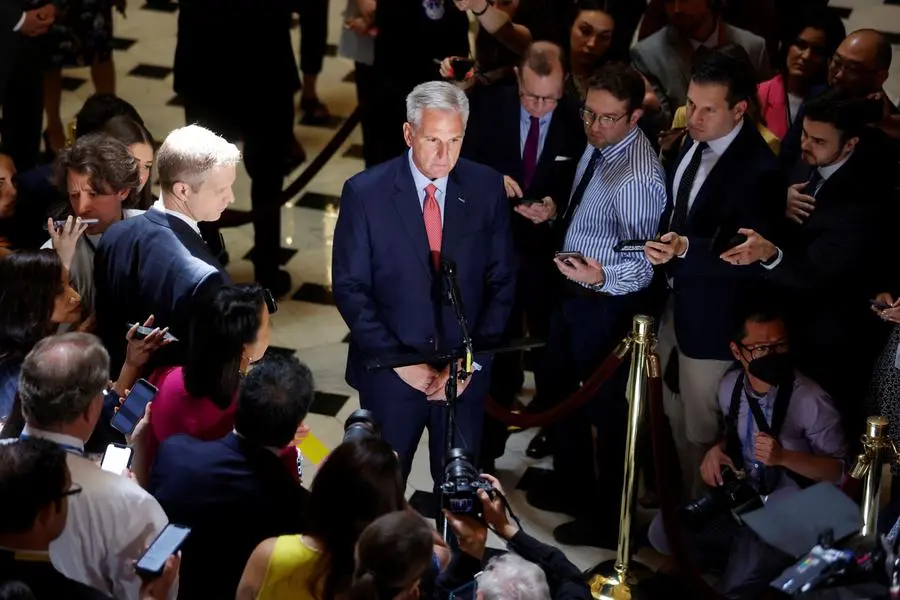PHOTO
WASHINGTON - White House and Republican negotiators made some progress in late-night talks over raising the government's $31.4 trillion debt ceiling, top congressional Republican Kevin McCarthy told reporters on Thursday.
Talks are going down to the wire as the Treasury Department has warned the government could run short of funds to cover all its expenses as soon as June 1, which without a deal could trigger a potential economically catastrophic default.
Democratic President Joe Biden and House of Representatives Speaker McCarthy are at odds over spending, taxes and work requirements for anti-poverty programs. But both sides say they believe they can find common ground after hours-long discussions by their negotiating teams on Wednesday that they characterized as productive.
"We worked well past midnight last night," McCarthy told reporters. "I thought we made some progress. There's still some outstanding issues and I've directed our team's work 24/7 to try to solve this problem."
Even as he made that pronouncement, McCarthy is preparing to possibly let lawmakers leave Washington on Thursday for a week-long holiday recess, with the proviso that they need to be ready to return for a vote.
Time is running short. The Treasury Department says the United States could run out of money to pay its bills as soon as June 1, seven days from now, if the debt ceiling is not raised. A U.S. default could upend global financial markets and push the United States into recession.
But Treasury's forecast is not iron-clad and some private sector analysts reckon the government could go another week without defaulting, which has led some hardliners in McCarthy's caucus to dismiss the significance of the June 1 deadline.
Asked if Treasury could meet its debt obligations after June 1 without a debt ceiling hike, McCarthy said: "There's always money coming in. But I leave that up to the Treasury secretary. I take June 1 as the deadline, always have."
Ratings agency Fitch said on Wednesday it had put the United States' "AAA" credit rating on negative watch, citing increasing political disputes around the country's debt limit. Fitch last put the United States on negative watch in October 2013.
"The brinkmanship over the debt ceiling, failure of the U.S. authorities to meaningfully tackle medium-term fiscal challenges ... and a growing debt burden signal downside risks to U.S. creditworthiness," Fitch said in its statement on Wednesday.
The months-long standoff has spooked Wall Street, weighing on U.S. stocks and pushing the nation's cost of borrowing higher. The yield on U.S. Treasury bills maturing in early June climbed in early Thursday trading, in a sign of investor unease.
THREE DAYS
Congress will need several days to pass any agreement through the Republican-controlled House and the Democratic-controlled Senate. Lawmakers regularly need to raise the self-imposed debt limit to cover the cost of spending and tax cuts they have already approved.
Representative Steve Scalise, the No. 2 House Republican, said lawmakers in that chamber will get three days to read any debt-ceiling bill before they have to vote on it. In the Senate, any one member can delay action for days.
The House was due to leave Washington on Thursday for a week-long Memorial Day holiday recess, though Scalise warned lawmakers to be ready to be called back to Washington for a vote if necessary.
McCarthy has insisted that any deal must cut discretionary spending next year and cap spending growth in the years to come, to slow the growth of the U.S. debt, now equal to the annual output of the economy.
Biden has offered to freeze spending at current levels next year and proposed several tax increases to help curb the debt.
Credit rating agency Moody's said it might reassess its top notch rating for the U.S. government if lawmakers fail to reach a deal. A prior debt-ceiling standoff in 2011 prompted rival ratings agency S&P Global to lower its rating.
Lawmakers from both parties are reluctant to compromise. Hardline House Republicans insist that Biden must agree to the sharp spending cuts they passed last month. Some Democrats accuse Republicans of holding the economy hostage to advance an agenda that would otherwise fall short.
"They are looking to waste time, play games and make sure we default because they think that somehow that is going to be a political advantage," Democratic Representative Ilhan Omar said at a news conference on Wednesday.
Biden spent months saying he would not negotiate on raising the debt limit only to reverse course and begin talks with McCarthy in the last few weeks.
The last time the federal government came this close to default was in 2011, with a similar power divide in Washington - a Democratic president and Senate majority and a Republican-controlled House.
(Reporting by David Morgan, Steve Holland, Andrea Shalal, Richard Cowan, and Gram Slattery; writing by Andy Sullivan; Editing by Scott Malone, Leslie Adler and Chizu Nomiyama)





















